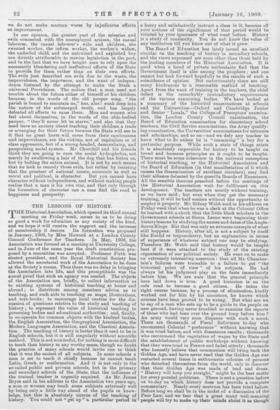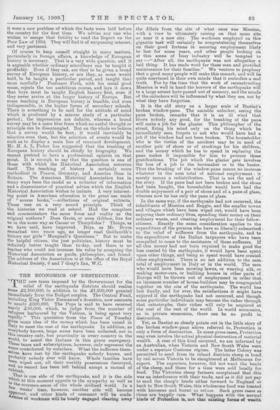THE LESSONS OF HISTORY. T HE Historical Association, which opened its
third annual meeting on Friday week, seems to us to be doing as good a work for education as any society of the kind, and we hope it will receive the support and, the increase of membership it desires. Its formation was proposed in January, 1906, by Miss Howard at a London County Council Conference for Teachers. In May, 1906, the Association was formed at a meeting at University College, and in June of the same year the draft constitution pro- posed by a committee was accepted. Professor Firth was elected president, and the Royal Historical Society has allowed the secretarial work of the Association to be done at the Society's rooms. Thus there was no delay in bringing the Association into life, and this promptitude was the surest proof that such an agency was needed. The objects of the Association are, briefly, to collect information as to existing systems of historical teaching at home and abroad ; to distribute among members advice as to teaching, and such aids to teaching as maps, illustrations, and text-books ; to encourage local centres for the dis- cussion of questions relative to the study and teaching of history ; to represent the value of historical teaching to governing bodies and educational authorities ; and, finally, to co-operate for common objects with the kindred bodies, the English Association, the Geographical Association, the Modern Languages Association, and the Classical Associa- tion. The teaching of history is better than it used to be in English schools, but it is still singularly without scientific method. This is not wonderful, for nothing is more difficult to teach than history in any worthy sense, though no doubt the practice of many schools would invite one to think that it was the easiest of all subjects. In some schools a man is set to teach it chiefly because he cannot teach Latin, Greek, or mathematics. And it is not only in the so-called public and private schools, but in the primary and secondary schools of the State, that the influence of the trained teacher is urgently required. As Mr. James Bryce said in his address to the Association two years ago, a man or woman may teach some subjects extremely well by being only a little way ahead of the pupils in know- ledge, but this is absolutely untrue of the teaching of history. You could not "get up" a particular period in a hurry and satisfactorily instruct a class in it, because all your notions of the significance of that period would be vitiated by your ignorance of what went before. History • is a study of continuity. You do not know the value of any institution till you know out of what it grew.
The Board of Education has lately issued an excellent circular on the teaching of history in secondary schools, and the views expressed are none other than those held by the leading members of the Historical Association. It is good when a band of private enthusiasts find that the Government itself is also among the prophets ; and one cannot but look forward hopefully to the results of such a coincidence of opinion. But unfortunately there are still many hindrances to a reasonable method of teaching. Apart from the want of training in the teachers, the chief defect is the remarkably contradictory requirements of the various examining bodies. We have looked at a summary of the historical examinations at schools and the Universities—Oxford and Cambridge Junior and Senior "Locals," the College of Preceptors' examina- tion, the London County Council examination, the Board of Education examination for elementary school teachers, the Civil Service examinations, the Army qualify- ing examination, the Universities' examinations for entrance and scholarships, and so on—and we defy any teacher to know what to do unless he is " cramming " a boy for a particular purpose. While such a state of things exists it is absolutely impossible for history to be taught on broad and humane principles as it ought to be taught. There must be some coherence in the national conception of historical teaching, or the Historical Association and the Board of Education (in that manifestation of it which causes the dissemination of excellent circulars) may find their alliance defeated by the guerilla Boards of Examiners. All the sensible theories preached before the meetings of the Historical Association wait for fulfilment on this development. The teachers are mostly without training, as we have said ; but even when they get the necessary training, it will be half useless without the opportunity to employ it properly. Mr. Sidney Webb said in his address on Friday week that when he was a clerk at the Colonial Office he learned with a shock that the little black scholars in the Government schools at Sierra Leone were beginning their history lessons by studying the names and &Arse of the Anglo- SaxonKings. But that was only an extreme example of what still happens. History, after all, is not a subject by itself like Euclid or trigonometry, but an explanation in terms of experience of whatever subject one may be studying. Therefore Mr. Webb said that history would be taught best if it were attached to the study of the existing organisation of our political society. He went on to make an extremely interesting assertion : that all Mr. Chamber- lain's failures were traceable to a failure to get "the historical point of view " of his subjects. He had always let his judgment play on the facts immediately before him. We are sure that the general principle here laid down is true. A good historian is on the safe road to become a good citizen. He takes the right course because, by a. process of elimination, kindly worked out for him by his ancestors, he knows which eourses have been proved to be wrong. But what are we to say of a man who sets up to be a guide to the people on new ground, having never troubled to examine the reports of those who had been over the ground long before him ? An army would very soon dispense with such a scout. There are thousands of Fiscal Reformers to-day who recommend Colonial " preference " without knowing that it was tried before, and with disastrous results ; thousands who recommend the regulation of wages by the State and the establishment of public workshops without knowing that they were tried in France and failed utterly ; thousands who honestly believe that communism will bring back the Golden Age, and have never read that the Golden Age was restarted several times in enthusiastic colonies of persons who detached themselves from the world, only to discover that their Golden Age was made of lead and dross. " History will keep you straight," might be the best motto for every puzzled politician. There is not a question before us to-day on which history does not provide a complete commentary. Nearly every nostrum has been tried before. Before long we shall be in the midst of a discussion of the Poor Law, and we fear that a great many well-meaning people will try to make up 'their minds about it as though' it were a new problem of which the facts were laid before the country for the first time. We advise any one who wishes to escape that futility to read the Report on the Poor Law of 1834. They will find it of surpassing interest, and very pertinent.
Of course to keep oneself straight in many matters, particularly in foreign affairs, a knowledge of European history is necessary. That is a very wide question, and it is arguable whether ordinary schoolboys can be taught it profitably. Even if they can, are they to be given a broad survey of European history, or are they, as some would hold, to be taught a particular period, and taught that most carefully ? Professor Firth, with his usual good sense, rejects the too ambitious course, and lays it down that boys must be taught English history first, even if they never arrive at the larger history of Europe. But sonic teaching in European history is feasible, and even indispensable, in the higher forms of secondary schools. There is something to be said for the attitude of mind which is produced by a minute study of a particular period ; the impressions are definite, whereas a broad survey may be a mere blur from which no useful thought or principle can be disentangled. But on the whole we believe that a survey would be best; it would inevitably be selective even then, but the selection of events would be such as to display a main line of reasoned development. Mr. H. A. L. Fisher has suggested that the teaching of European history should be chiefly by biography. We cannot pretend to have a professional opinion on that point. It is enough to say that the question is one of those with which the Historical Association concerns itself. The teaching of history is certainly more methodical in France, Germany, and America than in Britain. The American Historical Association has in many ways been the model as a collector of information and a disseminator of practical advice which the English Historical Association wishes to imitate. A very interest- ing point in American education is the greet use made of "source books,"—collections of original extracts. These rest on a very sound principle. Think of the histories we read at school. Had the compilers and commentators the same force and reality as the original authors ? Does Grote, or even Gibbon, live for us in the same way as Caesar or Thucydides ? Things, as we have said, have improved. Boys, as Mr. Bryce remarked two years ago, no longer read Goldsmith's history nor girls " Manguall's Questions." But to make the helpful citizen, the just politician, history must be infinitely better taught than to-day, and there is no teacher who could. not increase his value by accepting the Historical Association as guide, philosopher, and friend. The address of the Association is at the office of the Royal Historical Society, 6 and 7 Gray's Inn, W.C.





































 Previous page
Previous page